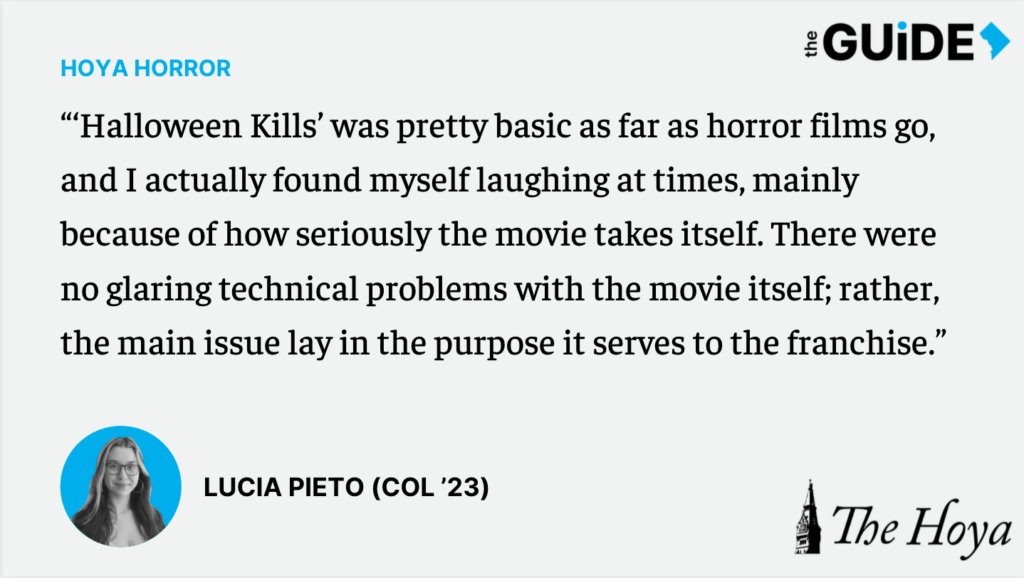I went into “Halloween Kills” (2021) expecting nothing, and that is what I got.
Not to say the film was not entertaining — it definitely was — I have just become exhausted with this franchise in particular, as most probably have. Spanning 12 different movies with a 13th titled “Halloween Ends” and set to come out in 2022, the “Halloween” franchise will have the most sequels of any recent horror series.
The events of this “Halloween” sequel follow immediately after the last installment, “Halloween” (2018), as the residents of Haddonfield, Ill., band together to try to kill Michael Myers (James Jude Courtney, Nick Castle) after he escapes the final trap set for him in the previous film by Laurie Strode (Jamie Lee Curtis), Strode’s daughter and granddaughter. The film ends as most of the “Halloween” movies do, with Michael Myers nearly defeated but rising once more to butcher a group of people and continue his reign of terror.
“Halloween Kills” was pretty basic as far as horror films go, and I actually found myself laughing at times, mainly because of how seriously the movie takes itself. There were no glaring technical problems with the movie itself; rather, the main issue lay in the purpose it serves to the franchise.
“Halloween Kills” was an attempt to be self-aware about how repetitive the films in the franchise have become, yet the movie falls flat as it realizes this is impossible. The movie constantly alludes to the final death of Michael Myers, even though he survives until the end. Furthermore, the film reiterates the tagline “Evil Dies Tonight,” despite the fact that the evil — as you could probably already guess — does not die, as that would signal an end to the franchise.
Big franchises are not intrinsically bad, and I myself am a huge fan of series like “Alien” and “Lord of the Rings.” However, there does come a point when franchises become so repetitive that they begin to disrupt the integrity of the original film, and “Halloween” is a particularly annoying example of this.
The original “Halloween” would have been better off as a stand-alone film. Though it does have an open ending, there was no real need to continue the story in order to expand upon the plot and the characters. Especially in the case of “Halloween,” franchises invest a majority of their resources into the same concepts and ideas, and little is done to actually invest in new ideas and creators. Even if horror film franchises ceased to exist, the primary objective of horror filmmaking would still be to make money; however, this can take the art and excitement out of subsequent films.
There are, however, ways to do horror franchises and sequels right, without being repetitive and instead adequately expanding on the original material. My favorite example of a horror sequel is the second “Texas Chainsaw Massacre” (1986), which was more comedic than the original and took risks that helped set it apart from the first film. The sequel was much more campy and did not attempt to be a serious continuation of the story, so the filmmakers were more free to take the story and characters in directions that made the series feel new and fun instead of a mere cash grab.
“Halloween” has come to a point where its reputation has shifted from an iconic and original 1970s horror film to a franchise that has gone on too long to the point that it has become cheesy. The elongation of the franchise is particularly harmful to horror because mainstream film institutions and audiences are now more likely to dismiss the plethora of horror sequels as deficient films.
“Halloween” should never have had a sequel, but given that it happened, the 2018 film would have been a great place to end the franchise, with three generations of Strode women finally bringing an end to Myers, making “Halloween Kills” feel that much more unnecessary.














